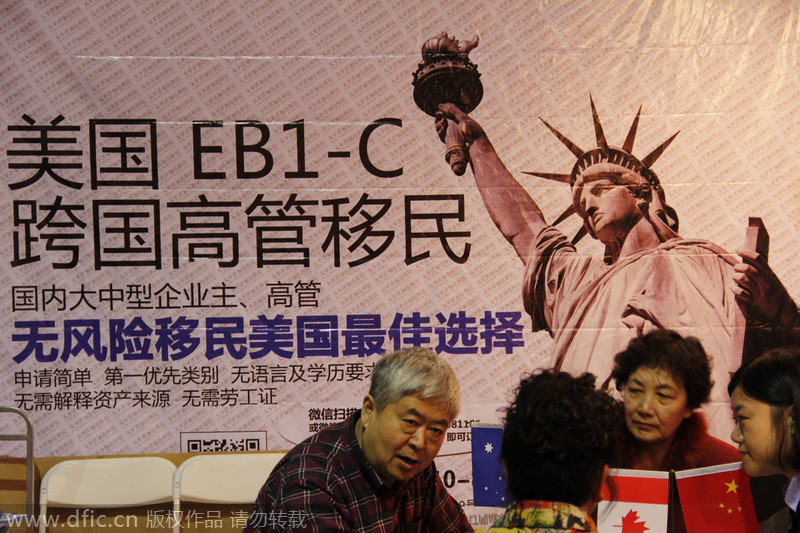|
 China's prospective emigrants seek advice about property-investment from counselors in Beijing, in this April, 2014 file photo. [Photo/IC] |
Those who have obtained residency permits or citizenship abroad but have not cancelled their Chinese household registrations - especially if they face allegations of corruption - will become an even greater focus of police investigations, in the latest measure in the fight against graft, the Ministry of Public Security said.
"If evidence is uncovered, they may face departure restrictions if they return to China to visit family members," a senior official from the ministry, who requested anonymity, told China Daily.
Police will examine bank accounts and financial transactions as well as input from the public, he said.
It is mandatory for Chinese citizens who settle in other countries to cancel their household registrations, or hukou, before emigrating.
There has been a rise in emigrants obtaining permanent residence overseas, especially in the United States and Canada, but many did not give up their local hukou that allow them to benefit from welfare services, such as medical insurance, pensions and children's education.
According to the US government, 35,387 Chinese people opted to become US citizens last year, an increase of 11 percent over 2012.
There was also a rise in the number of Chinese emigrants, including those facing allegations of corruption, who obtained US green cards or became permanent residents in the US but did not cancel their hukou.
According to Beijing Hezhong, a company that facilitates migration services, it has seen an annual 20 percent increase since 2011 in the number of Chinese citizens applying for the EB-5 investment immigration program in the US, with about 500 to 600 applicants each year.
In July, the ministry appealed to the public to volunteer information regarding emigrants maintaining their hukou.
From 2013 to June 2014, the ministry cancelled 1.06 million hukou that were still illegally registered by Chinese citizens.
"This measure is an effective step to curb and fight corruption," said Dai Peng, director of the criminal investigation department of the People's Public Security University of China.
Once corrupt officials obtain green cards or residency permits in other countries, they will "cover their real identities, then transfer a large quantity of illegal assets through either money laundering or underground banks, before fleeing abroad".
Dai suggested police officers pay attention to people who frequently travel to and from China, or send large amount of funds to overseas accounts.
Zhang Lihua, a lawyer who specializes in overseas immigration from the All-China Lawyers Association, said judicial authorities, including customs and police in China, should establish an information sharing platform.
